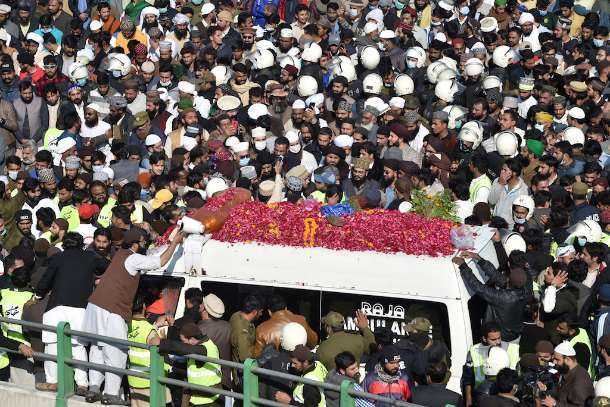
Activists and supporters of Tehreek-e-Labbaik Pakistan (TLP) gather around an ambulance carrying the coffin of TLP founder Khadim Hussain Rizvi during his funeral procession in Lahore on Nov. 21. (Photo: Arif ALI/AFP)
The year was 2018. The Supreme Court had set aside the death sentence for blasphemy of Catholic woman Asia Bibi and ordered her release from prison.
Security had been beefed up at churches across Pakistan following the release of the high-profile victim. Mobile phone and internet services were suspended as protests erupted in various cities. Catholic institutes allowed staff to leave work early.
In Lahore, hundreds of supporters of hardline Sunni group Tehreek-e-Labaik Pakistan (TLP) occupied an intersection near the Punjab Assembly. Unable to pass the traffic jam, I decided to walk toward the famous Charing Cross laid out during the British Raj era.
TLP chief Khadim Hussain Rizvi ruled the roads in those days. His baton-wielding activists had set up security checkpoints at bus stops. One of them checked me thoroughly before allowing me to join the Islamic protesters. Shalwar kameez (a traditional tunic with pleated trousers) was my only cover.
That’s where I saw Rizvi for the first time. He was calling for the death of the three judges who overturned Asia Bibi's death sentence.
"This date will never be forgotten; we used to walk with our heads up in pride. This is a big revenge. We shall not tolerate this. Come out of your houses. It is time to be beheaded to defend the sanctity of Prophet Muhammad. Our protest will not end," he roared.
"Damn the agencies who stood with Asia — you have lost your conscience for salaries. Either leave kalma [the Islamic proclamation of faith] or be loyal to Islam."
My second sighting of Rizvi two months later was not so intimate. I was filming the flower-covered road outside the anti-terrorism court. He was leaving in a police van after attending a hearing. "I am Khadim Hussain Rizvi and I am not a terrorist," stated placards of his supporters. The wheelchair-bound cleric was charged with sedition and terrorism for staging violent protests. “Will they leave our Baba gee [father]?” a woman asked me.
Rizvi’s funeral on Nov. 21 was said to be the biggest funeral in the history of Lahore. Human rights activists expressed their concern at the show of muscle by religious extremists. The attendance of more than a million included some clerics from the interfaith group of Archbishop Sebastian Shaw of Lahore and several NGOs.
The controversy started when one of them shared his photos from the funeral on Facebook.
“Friends in interfaith should sweep their surroundings. Intellectual pollution and a wish for heaven are at their peak. The death of Khadim Rizvi has given me a chance to filter my friend list. Operation clean-up has started,” stated Samson Salamat, chairman of the interreligious Rawadari Tehreek (Movement for Tolerance), in a Facebook post.
A gifted orator
Despite his success in weaponizing blasphemy laws, Rizvi won fans even in the Catholic Church.
“He was a gifted orator who touched the heart of millions. He was a master in lovingly punctuating his arguments with the poetry of Allama Iqbal [the national poet],” a Catholic humanitarian coordinator told me.
“He only demanded death for the blasphemer, not the whole community. He put a plug on the trend of attacks on churches and missionary schools that started in the ’70s following anti-Islamic acts in the West and gave a new direction to our jihadi society. It was his indirect message.”
There is no denying the anger in Rizvi’s vitriolic sermons. He was the biggest obstacle to the freedom of Asia Bibi, who spent eight years on death row on a blasphemy charge. He may not have been a terrorist but he inspired terrorists like Mumtaz Qadri, a police commando who assassinated liberal Punjab governor Salman Taseer for his stance on blasphemy laws, and Ali Hassan, who is today in a Paris jail after allegedly attacking and seriously wounding two people with a meat cleaver.
In the 2018 general election, Rizvi’s TLP won three seats in the Sindh Assembly. His manifesto included providing due rights to women and minorities as outlined by Islam.
Rizvi was a leader, whether we agree with his ideology or not. His legacy will continue with his followers, who are mostly from the poor strata of society. Pakistani minorities must learn to adapt to this reality. That’s the reason Archbishop Shaw prioritizes interfaith efforts after his pastoral engagements. He seldom accepts invitations to ecumenical gatherings, a pastor told me.
Semi-literate pastors are mainly responsible for most of the blasphemy cases against Pakistan Christians. Learning Arabic and teaching the Quran in seminaries can help church leaders in conveying the message of minorities in their language. Instead of organizing lavish dinners to host auctions for votes for Protestant bishops and signing contracts for church buildings, leaders should focus on uplifting the community through quality education.
Instead of being threatened by TLP and similar groups and blocking them on social media, the Church has to continue diplomacy as well as a good cop/bad cop routine. Membership of church interfaith dialogue groups shouldn’t require cutting ties with other groups. Yes to understanding and trust. No to censorship and a ghetto mindset.
Prime Minister Imran Khan and army chief General Qamar Javed Bajwa both expressed public condolences on Rizvi’s passing. Perhaps Christian activists should do the same as a gesture of goodwill.
“Kindness — benevolence — means the firm and persevering intention to always will the good of others, even those unfriendly to us,” says Pope Francis.
The views expressed in this article are those of the author and do not necessarily reflect the official editorial position of UCA News.


